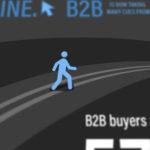Worthix: When Does the Customer Experience Begin for Your B2B Buyer?

{% video_player “embed_player” overrideable=False, type=’scriptV4′, hide_playlist=True, viral_sharing=False, embed_button=False, width=’1920′, height=’1080′, player_id=’23713521183′, style=” %}
When does the Customer Experience begin for your B2B tech buyer? When does it end?
Mary Drumond, the CMO of Worthix and the host of the “Voices of CX” podcast, sat down with me to talk about how to treat your potential customers and, more importantly, how to learn from them along the way.
In our interview, we discuss:
- The Customer Experience Economy – what is it, where did it come from, and what it means to your business
- The problem with most customer surveys and how Worthix is fixing it – surveys don’t have to suck
- How to uncover the most important customer comments that will actually help you grow your business
Watch all the way to the end of the video. Mary gets on her soapbox about one topic. Don’t miss it.
Would you like your company featured on “Series A, B, C?” Drop me a line and tell me about your B2B tech company.
Transcript of Video
Angus Nelson: Welcome to “Series A,B,C” where technology companies share their insights to strategy and growth. I’m your host Angus Nelson, Director of Development here at Golden Spiral and today I’m talking to Mary Drumond. She’s the Chief Marketing Officer at Worthix, and she’s also the host of the little logo you see behind her.
Mary Drumond: The very discreet one, yeah.
Angus Nelson: The very discreet one, the host of the “Voices of CX” podcast, where she has interviewed some of the most influential customer experience, thought leaders, practitioners on challenges and innovation in CX. So welcome to the show, Mary.
Mary Drumond: Happy to be here. Thanks so much.
Angus Nelson: I have heard you say, and we are now in this period called the customer experience economy. Can you please take a moment and explain what that means and why it’s important for our B2B companies to recognize?
Mary Drumond: Gone are the days of the product economy, where it was all about the product and even servicing around the product, what customers need right now is an experience from beginning to end. And we’re not always talking about experience in the sense of flying a hot air balloon over Cappadocia. That, I mean, sure, great, but that’s not what it’s about. What it’s about is allowing your customer to every single step of the way experience your brand from way before from the very first time they encounter your brand, whether it’s through media, whether it’s through word of mouth, that’s when your relationship with your customer begins. And it goes all the way through the moment of purchase, the lifespan that you have with the customer, the end of your relationship with the customer and past that.
Angus Nelson: But, and here’s the problem with what it seems marketing functions today, it’s as if the marketer has to have so many disciplines of tracking analytics and doing content and doing like dot, dot, dot, dot. But it’s from this full cycle experience from the moment they’re getting marketing and now it’s acquisition and then the handoff to sales, and then a hand off the customer success. It is, like you said, it is kind of a full scope. So let’s say a marketer was jumping into kind of this understanding. What would be some like core questions a marketing team would ask of customer success to better understand their customer base?
Mary Drumond: Customer Experience is marketing. It’s just looking at marketing from a higher angle or from above, right? It’s understanding that every single moment has its effect on the customer. So from a marketers– I’m a marketer myself and I’m going around preaching about customer experience to people, and the thing that marketers sometimes forget is that our job is to get our customers to see us as a brand, perceive us as a brand or raise their hand or request a demo or whatever it is. And then once we’ve got them in the bag, then they’re off to sales.
And then from sales they’re off to customer success like you said and then once they’re there, it’s just customer service. It’s not. The experience economy means that once they enter the company, once they’ve been marketed to, you have to continuously market to your customer every single step of the way.
And why is that? The market is super commoditized. They can go to the competition anytime, churn rates are through the ceiling and churning is faster than ever. So if you’re not able to maintain that communication and that experience, continuously market to your customer as they go through all these different cycles in your organization. Then you’re doing the wrong thing and you’re not fit for the current economy. But how do you understand what’s keeping your customer with your brand? What’s making them, every single month, accept their credit card to be debited for that subscription or to pay that invoice or to purchase at a store? What is it that’s making them stay? And if they’re not staying, then what is it that’s making them go? And I think those are the most important questions that marketers can ask from the customer success team.
Angus Nelson: In the past, people have built personas and they have this structure of who it is they’re actually marketing to. But now it’s become like so real time that you, as a company Worthix, have a solution that is really shrinking the gap of understanding your customer. Can you maybe explain what does that benefit of working with a product like yours? Incorporating artificial intelligence into knowing the customer.
Mary Drumond: When we talk about VOC surveys or voice of customer surveys, which is basically opening a dialogue with your customer to listen to what they have to say. The current state of affairs is super long clunky surveys that everybody hates. And my not elevator pitch, my three second pitch when people ask what Worthix does is we try to make surveys suck less. Because we do, we try to make surveys not bad for the customer and not bad for the company, so it’s both sides of the coin. For customers, it’s horrible to answer surveys because it’s super long, and the questions that are being asked aren’t necessarily related to what the customer needs to talk about at that moment.
So it’s actually a very frustrating experience from a customer end. And from a company end, they’re receiving these answers that are sometimes totally unrelated to the questions they’re asking, probably cause customers don’t want to answer that question, but also because there’s so much information and so much data that it’s like finding a needle in a haystack. How do you even find the actual motivators of customers’ decisions?
So I’ll give you an example. When call centers send marketing or send consumer insight departments the list of complaints that customers have, lots of times way high up there, you’ll have something really normal like delivery time. The delivery time is super long and that sucks. And then the whole company’s like, “Oh my God, we’ve got to invest millions of dollars in improving the logistics or the delivery or whatever so that customers get their products more quickly.” But sometimes they tend to forget things that are way further down the line of complaints, which are a lot more impactful. And when they happen, they’ve got a much higher potential of generating churn.
So for instance, a customer of ours found in seventh place the complaint of a credit card discrepancy or billing issues. And the truth is that almost every time there was a mistake in billing that wasn’t solved, the customer churned. And it wasn’t high up there in frequency, so executives weren’t even paying attention to it, but they were just like, it was like a faucet. They were just pouring out customers and they didn’t even look because it wasn’t high enough on to gather the attention of decision-makers.
So lots of times what you have is that the highest frequency is not the highest impact. And what you need to understand from a company perspective is among all that data that you’re collecting from all those surveys in those questions that you’re asking your customers, which answers or which feedback actually refers to what’s driving consumers to make their decisions. And if you’re able to do that, then honestly you’re a freaking superhero. Cause if you know what’s making your customers stay and you know what’s making them go, then it becomes that much easier to solve the problem. Right? So that’s what Worthix is trying to do with our surveys. We’re trying to deliver the actual impact value of customer feedback.
Angus Nelson: And Worthix, you’ve been around for how many years now? As a company?
Mary Drumond: Not that long. We were incorporated in 2015 but we started operations at the beginning of 2017.
Angus Nelson: And then you came on board shortly thereafter, cause you’ve been like two plus years or so?
Mary Drumond: Yeah.
Angus Nelson: And no this last year you got a round of funding. And so you went from being this small company that’s doing what you can, like every other small company.
Mary Drumond: Hustling.
Angus Nelson: Right. Hustling, doing the thing. And then you raise six million and now all of a sudden you’ve got those moments where now you really have to perform, you have to deliver. What has changed as a company, as in leadership, strategically now that you’ve reached that next level of play?
Mary Drumond: So strategically we got a ramp up, right? So this is the moment for us to take this money, and really increase our talent and get a lot of really capable people on board that’ll help take us to the next level. Right? And that’s what we’re focused on right now. So our main focus is on recruiting and finding talented people that’ll help build a company structure that we need to then reach the next level.
From a marketing standpoint, not much has changed and I’ll tell you why. I am a strong, strong believer in zero budget marketing. It’s my favorite thing. I don’t like throwing money at things. I don’t think it’s productive. I think that when we had to hack through it and actually find creative ways to make a difference with zero to no budget, that’s when it actually gets interesting because I want to keep us authentic as possible. I don’t want to be out there paying for clicks and try to trick people to click on some email or click on some call to action to access our shit. We’re great. Our value proposition is freaking amazing and it’s interesting and it’s valuable. So all we have to do is find a way to get that message to reach people because it sells itself. So I want to keep doing that. Honestly, even if you know, if we’re going for a series B or E D F plus whatever, I still want to try to keep that grassroots zero budget marketing, whatever, to maintain that soul, that authenticity to what we’re doing.
Angus Nelson: On that same token with differentiation as a company, now you have some abilities where AI is everywhere, it’s in everything and now it’s being incorporated into this customer experience and understanding surveys. Everything’s speed, everything is differentiation. Everything is how do you communicate your product in a bigger, better way? What is the way that you are staving off your competitors and maintaining your market share if not growing your market share that sets you apart?
Mary Drumond: So you want me to tell you my secret sauce? That’s basically what you’re saying.
Angus Nelson: What’s your secret sauce?
Mary Drumond: A lot of companies out there are doing surveys using AI and I think it’s great because AI it basically facilitates, it takes out the really straining going through Excel sheets and the to analyze open ended responses. Right? And that’s what a lot of companies are doing. They’re using really cool companies like Clarabridge, for example, that has NLP, that’s working on analyzing that data, right?
That is not what we focus on though because our NLP does allow us to have like 80% of our survey being open ended questions, which is something that nobody does, which also allows us to get really real responses from customers because they’re just not marking it on an Americ scale. It’s actually saying, tell us what you think about this in your words, and we can only do that because we’ve got that NLP that will process all those responses. Right? But other than that, what we’re being able to do is in real time understanding what the customer’s talking about in the survey and offer a followup questions to get them to dive deeper into what they’re talking about. And that’s when you get the really interesting stuff because that’s when you’re able to understand the true motivators of customer decisions, whether they’re from an emotional standpoint or whether they’re from a logical standpoint, whether they’re interested in discussing the quality of your products, the relationship they have with your brand, or a series of other drivers that are the ones that are truly impacting the decision. Right? So that’s what we were able to do with our super crazy, amazing AI and we’re the only ones doing it.
Mary Drumond: And it’s really cool. It’s really amazing. But kudos to the survey techs out there that have started using artificial intelligence, whether it’s for machine learning or natural language processing to better process surveys and to offer better experiences, better survey experiences to people. Because nobody wants to answer a survey nowadays because they suck, so let’s make it not suck.
Angus Nelson: Unless it’s a personality survey that tells me something amazing about my narcissistic self, right?
Mary Drumond: Sure.
Angus Nelson: So my final question for you and probably the most important question. Someone who’s sitting in your shoes for a company, they got the responsibility of carrying the load, of engaging a new audience, building a market for a product they believe in whole heart.
Mary Drumond: Sure.
Angus Nelson: What is some piece of advice that you would share that is a lesson you’ve learned that’s made all the difference in the world?
Mary Drumond: Be the number one evangelist of your brand and your company. I mean, definitely what makes me passionate about Worthix and people say, Oh, you’re so outspoken. I was like, yeah, I like what I do. So be the number one fan. Only join a company that you are in love with. Only accept a role as a chief marketer if you’re going to be the chief evangelist of that brand, if you’re going to be the one that goes out there, and when you talk about that brand, people get chills. When they hear you speak. they’re like, I want some of that. I’ll have what she’s having.
Estelle Reiner: I’ll have what she’s having.
Mary Drumond: Because that I think is what really makes a difference. When you’re small, when you’re getting started and you don’t have money to compete with the big giants that are out there. The way you make a difference is through your passion and through your authenticity. So that would be my recommendation.
Angus Nelson: Thank you so much for joining me today. For those of you who are interested, Worthix precisely measures the why behind buying decisions, giving your company the power to tactically identify where in the customer journey to invest. This show has been brought to you by Golden Spiral, a full service B2B technology and marketing agency built to help companies generate demand and realize their market potential. For more information, you can go to golden spiral marketing.com. Thank you so much for spending your precious time with us today. Thanks so much, Mary. Thank you, Angus. Great talking to you.


